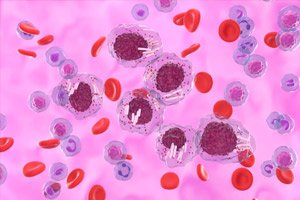
All iLive content is medically reviewed or fact checked to ensure as much factual accuracy as possible.
We have strict sourcing guidelines and only link to reputable media sites, academic research institutions and, whenever possible, medically peer reviewed studies. Note that the numbers in parentheses ([1], [2], etc.) are clickable links to these studies.
If you feel that any of our content is inaccurate, out-of-date, or otherwise questionable, please select it and press Ctrl + Enter.
New discovery could lead to more effective treatments for drug-resistant leukemia
Last reviewed: 02.07.2025

Scientists from Duke-NUS Medical School and colleagues have identified an inherited genetic variation common among East Asians that contributes to drug resistance and accelerated cancer cell growth in patients with chronic myeloid leukaemia. To address this, the team has developed an innovative approach that targets the MCL-1 protein, which has shown promising results in the lab, demonstrating efficacy in killing cancer cells that are resistant to traditional treatments. The findings, published in the journal Leukemia, highlight the importance of genetic profiling to develop more precise and effective treatments for patients with cancer.
Around one-sixth of all cancers are linked to genetic variations, but few studies have looked at how this affects treatment outcomes. The team focused on an inherited genetic variation that affects patients with leukemia.
In 2020, leukemia (blood cancer) accounted for approximately 2.5% of all new cancer cases and 3.1% of deaths worldwide. Chronic myelogenous leukemia (CML) is a subtype that primarily affects the bone marrow, which produces blood cells.
Scientists at Duke-NUS, together with partners including Singapore General Hospital and The Jackson Laboratory, have developed the first preclinical model of a common genetic variation in East Asian populations, including Chinese, Japanese and Koreans. Around 12-15% of people from this region have an inherited genetic variation in a protein called BCL-2 interacting death mediator (BIM), which plays an important role in regulating cell death and removing damaged or unwanted cells. Many cancer treatments activate this process to kill tumour cells.
The researchers conducted a series of experiments using a specially designed model and showed that the variation leads to the formation of alternative versions of the BIM protein, which helps cancer cells avoid death. As a result, tumor cells live longer and multiply more aggressively, contributing to the progression of the disease.
One of the most common treatments for chronic myeloid leukemia is a class of drugs known as tyrosine kinase inhibitors, of which imatinib is one of the most commonly used. However, patients with the BIM variant respond poorly to imatinib, and fewer cancer cells are killed by the treatment.
The study found that leukemia cells with the BIM variation had higher survival rates than cells without the variation. These cells were resistant to the cell death normally caused by imatinib, allowing the leukemia to progress more aggressively.
Dr Giselle Na, a research fellow in the Duke-NUS Cancer Biology and Stem Cell Programme and first author of the study, commented: "We found that leukaemia cells with the BIM variation rely predominantly on the MCL-1 protein for survival. This important discovery has identified a vulnerability in these imatinib-resistant cancer cells that could be exploited to develop new and more effective treatments."
Professor Ong Sin Tiong, a clinician-scientist in the Duke-NUS Cancer Biology and Stem Cell Programme and senior author of the study, said: "Based on these findings, we tried a new treatment that combines an MCL-1 blocker with imatinib. The results were encouraging, with the combination being much more effective in killing resistant leukaemia cells compared to imatinib alone. This shows that blocking MCL-1 could help combat treatment resistance in CML patients with the BIM variant and reduce the risk of disease progression."
Professor Charles Chuah, senior consultant in the department of haematology at Singapore General Hospital and National Cancer Centre Singapore, who was also involved in the study, added: "Getting the right treatment as early as possible is critical to improving patient outcomes and quality of life. Given the prevalence of the BIM variation in the East Asian population, it is important to understand its impact on cancer treatment. Our findings suggest that genetic testing for this variation at diagnosis could improve outcomes by helping to identify patients who may benefit from more aggressive therapy."
These findings could have significant implications for other cancers, such as some types of lung cancer, which use activation of the BIM protein to kill tumor cells. The scientists plan to continue their research in this area to bring the benefits of personalized medicine to more patients.
